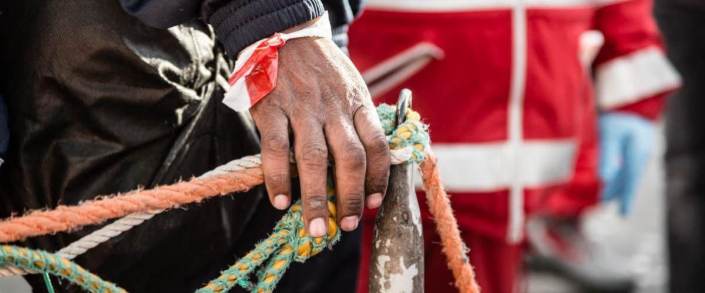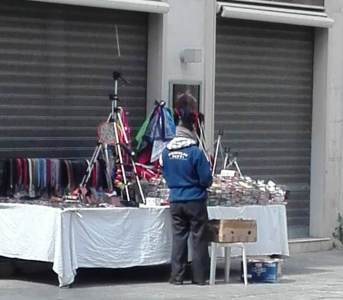Market Commodities: Surviving in a System of Rejection
A’s story can be found repeated in many other places in Sicily, a story which includes not only minors but also women and men who have been here for many months and “rejection” from the very centres that were meant to welcome them. In the last few weeks more than 1,000 migrants arrived at the port of Catania, 850 on Sunday alone, on board the Bourbon Argos, and 288 a few days later, along with 20 bodies.
Many of them have been transferred, as usual, to the CARA* at Mineo, absent of late from the pages of the daily newspapers, but still charged with housing 5,000 people. Those who are moved there remain merely numbers, left to themselves during a period in which migrants require, in truth, adequate and competent individual support, as foreseen by law. This relates not only to the process of obtaining documents, but also to possible inclusion in the host society and above all to the vulnerable and fragile condition of so many migrants, first and foremost those who have survived the shipwrecks.
The daily reality of Mineo is a place of abandonment and oppression, where desperation creates a state of conflict and where a system of structural violence continually harvests its victims. Only a few days ago the story arrived of yet another migrant who had been run over on his bicycle near the CARA*; in April the same fate met a young 25-year-old man who then died at the beginning of summer. Situated in the middle of nowhere, 7km from the nearest inhabited town, the only means of transport available is by bicycle. And frequently the only method of earning a living for one’s family, or to not leave oneself to die during the 18 months’ of waiting, is to work in the fields, in a regime of exploitation, which migrants have to reach by pedalling for kilometres along dark and unsafe roads.
This kind of blackmailing, and the position of extreme instability and need in which refugees find themselves, and which they often willingly leave, makes them the perfect prey for a system of exploitation which ranges from gang-masters to prostitution to the management of “reception centres”, as if we were talking about market goods and not human beings.
The most common justification is always the same: the lack of available places for the powerless arrivals. The argument closes here, as if this were something still acceptable after years in which it has been clear to everyone that the phenomenon of migration cannot be managed through a policy of rejection and selection, and a system based on hand-outs, even when it goes well. For the same reason, by now no one is even shocked when hundreds of people are amassed for weeks at a time in the tent-city inside the port of Augusta, a place structurally inadequate and decisively unhealthy due to its proximity to the incinerator and the huge amount of dust and sulphur in the air. It would be enough to note only this in order to argue for the immediate transfer of the migrants who remain there immediately upon landing, but even today there is no public news of an official complaint or opposition of this kind from those who work at the port’s tent-city, with all due respect to everyone’s right to good health.
Just as at the Hotspot of Pozzallo, it is the minors who often stay the longest at Augusta; after the most recent landings there are several dozen of them stuck at the port for the past two weeks. There are never-ending debates about quotas and failed attempts at redistribution, so as to avoid saying that only safe and legal channels could put an end to the crossings which become massacres, and the trafficking of human beings. It is not enough to try and improve what exists already, without denouncing the complete human failure in which we are collaborating, and to try and effect an alternative.
Then there are those who are rejected by our system as soon as they leave, such as the dozens of North African citizens rejected in recent days. Over the course of Saturday 5 November, around 20 Tunisian migrants reached the port of Pozzallo in total invisibility; the Prefecture of Ragusa did not activate the usual channels of communication and the organisations set up for reception, protection and information at the quay were not alerted, nor was Civil Protection. This was an extremely serious incident, and we hope that the above organisations shed some light on it. The Tunisians themselves were deported the following Monday to the deportation centre (CIE*) with an expulsion notice in hand.
Every week dozens of minors leave the Hotspots, the port and the centres, covering kilometres of road to reach the Catania train station, removing themselves from a system which, instead of protecting them, pushes them to run away. “The only reason that I’m still here is connected to the reason I fled in the first place, because I’ve got an illness”, ‘S’ tells us, a thirty-year-old Nigerian man housed in the CAS at Marina di Modica run by Cooperative Azione Sociale. “There are lots of things which seem impossible to you, which happen in other parts of the world, such as not being able to cure yourself for want of money, That’s why I ran away, and know I find myself stuck here, without even being able to move, and with little possibility to even speak to anyone”, he continues. “The only worker who speaks English in our centre was dismissed, so know I can only communicate with the other guys. We go to school, but otherwise we’re living in the middle of nowhere and the only distraction is our phones. I got a bit of attention from the workers once I recovered, but as soon as I got ill again my requests for medicine and explanations came to nothing, just like before. Once again I just became one of the 40 residents who awake every morning worrying about their documents and work and at night cannot even sleep, thanks to same fixed thoughts, while the mosquitoes and insect literally attack us.”
‘S’ helped several of his friends to leave the centre this summer, for which he was given a notice to leave the hostel system, a practice often abused due to the inability to manage conflicts in the centres, above all when there are so many residents. The managers do not even count the number of people present, and therefore also the newcomers, because the migrants continue to arrive. “I think it’s worse than before, but I always believe that rights aren’t guaranteed, but need to be won. We migrants are simply a commodity, and the market is huge.”
Lucia Borghi
Borderline Sicilia
Project “OpenEurope” – Oxfam Italia, Diaconia Valdese, Borderline Sicilia Onlus
*CARA – Centro di accoglienza per richiedenti asilo: reception centre for asylum seekers
*CIE – Centro di Identificazione e Espulsione (Identification and Expulsion Centre)
Translation: Richard Braude



